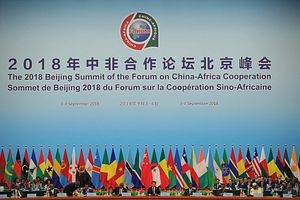The Diplomat author Mercy Kuo regularly engages subject-matter experts, policy practitioners, and strategic thinkers across the globe for their diverse insights into U.S. Asia policy. This conversation with Linda Calabrese – research fellow and development economist at the Overseas Development Institute in London – explores China’s loans to African countries, and the impact COVID-19 (and the resulting economic crisis) could have on debt payments.
Explain the impact of COVID-19 on African countries’ debt vis-à-vis China.
With their economies hit by the COVID-19 crisis, African countries face a double health and economic challenge: they need to allocate resources towardS protecting the health of their citizens, while trying to minimize the negative economic outcomes of the pandemic. At the same time, they are burdened by their debt. Many African countries are paying back what they borrowed and have little room to divert these resources towards more pressing health and economic needs.
China is widely regarded as Africa’s largest bilateral creditor. The Chinese government, banks and SOEs [state-owned enterprises] are estimated to hold 17 percent to 24 percent of Africa’s external debt. But African countries also owe money to other governments, to multilaterals, and to the private sector. The latter is estimated to hold 30 percent of Africa’s total external debt, upward of $130 billion.
Within Africa, there are huge variations to this pattern. Only a handful of countries, such as Zambia and Djibouti, owe most of their debt to China. Other countries have loaned heavily from other bilaterals, multilaterals or the private sector. Countries such as Ethiopia (one of China’s main borrowers in Africa), Nigeria, and Kenya spend more money to pay back private creditors than the Chinese government and policy banks.
What are the prospects of China providing debt-relief programs for Africa?
The Chinese government is contributing to the IMF’s Catastrophe Containment and Relief Trust, to support debt service relief for the poorest countries. Moreover, as part of the G-20, China took part to the eight-month debt moratorium (payment suspension) agreed for poor countries. China does not usually take place in these multilateral initiatives, so this may signal a shift going forward.
The moratorium, however, is only a short-term suspension of payments, and does not entail restructuring, reduction, or forgiveness of the debt already incurred. The Chinese Ministry of Foreign Affairs said that they are “keeping in contact” with poor countries bilaterally on the debt issue, but so far we have not seen much progress on this front.
In the past, China has also forgiven debt for low-income countries, but this was mostly zero-interest loans, which are a small share of China’s total debt portfolio. If we have to predict what will happen based on past experience, then our best guess would be that relief of Chinese debt will be limited, and that further suspensions of payment or some form of restructuring are more likely outcomes.
Describe the consequences if African nations default on Chinese loans.
Defaulting on loans has some negative economic implications, regardless of the origin of the loans. Countries that default will find it harder to borrow in the future, and they could face broader negative repercussions on their economies.
For most countries in Africa, China is only one among many creditors and therefore it would not make sense to only default on Chinese loans. This could work for those countries which owe most of their debt to China – but then, these countries might find it difficult to borrow from China again. And since only a handful of countries owe most of their debt to China, the global repercussions would be minimal.
Assess the geopolitical implications of Africa’s heavy indebtedness toward China.
For the past few years, the main discussions around China’s lending have focused on an alleged “debt-trap diplomacy.” However, this claim seems to be unsupported by the evidence.
China’s role as a lender to low-income countries has increased dramatically in the last few decades, and this has implications for the rest of the world. China’s financing to African countries is bringing the two blocs closer together, while the U.S. and Europe are losing ground in their relationship with Africa. The renewed interest that the U.S. and the U.K. have shown towards Africa in the last few years is partly due to their fear that China will replace them in their traditional sphere of influence.
Why should U.S. and Western policymakers be concerned about the COVID-19 impact on Africa-China relations?
The U.S. and Europe would not be willing to go about forgiving debt if China doesn’t. For them, this would be equivalent to a transfer of resources from the pockets of American and European governments (and taxpayers) to the Chinese government.
But I would not say that the U.S. and European policymakers should be concerned about the impact of the pandemic on Africa-China relations. Rather, they should be worried about how the pandemic will affect Africa. A public health and economic crisis in African countries, beyond being dramatic for African citizens, will also have negative global repercussions. This is why a fast, coordinated response to support African countries needs to be urgently implemented.

































